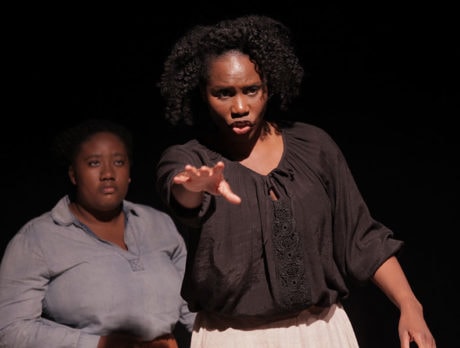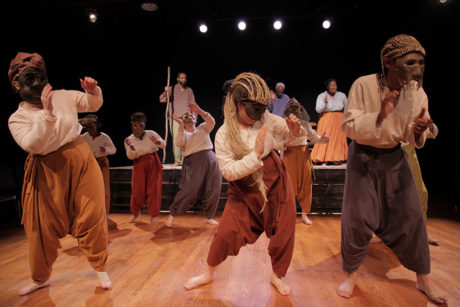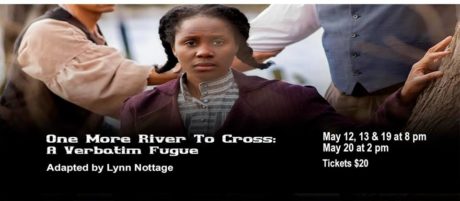Lynn Nottage wrote One More River to Cross: A Verbatim Fugue a decade ago, yet oddly enough, it has never been produced onstage before. As Nottage’s fame has grown – she just earned a Pulitzer Prize for Drama (and a Tony Award nomination for Best Play) for her Broadway debut Sweat, and a fine production of her 2003 play Intimate Apparel is now playing at the McCarter Theatre – this play has never gotten its due. It was published years ago and been available for production, but nobody has taken a chance on it. That is, until Pulley & Buttonhole Theatre Company took it down from the shelf. (The show ran at Pulley & Buttonhole’s home in Jenkintown earlier this month before its current engagement at The Latvian Society.)

Once you see the result, you’ll wonder what took so long. One More River to Cross is a play that’s both startling in its simplicity and powerful in its execution. Without making any grand theatrical gestures, Nottage tells the stories of American slaves in the most direct way possible: by using their own words.
In the late 1930s, the Federal Writers’ Project interviewed more than 2,300 emancipated slaves in order to document their lives. Nottage’s play takes the words of about 30 of those survivors and intertwines them, creating a narrative that follows the course of slavery in America, tracing these tragic and disrupted lives from Africa to the Civil War and beyond. The words have a straightforward authenticity and eloquence that no dramatization can match.
Four storytellers (Beatrice Alonna, Kareem “Doc” Carpenter, Kamili Feelings and Sara Osi Scott) command a platform at the rear of the stage, alternating in their narration and giving impassioned voice to these long-silent figures. The descriptions of torture and subhuman treatment are vivid and harrowing, though leavened with flashes of humor and joy from time to time.
Eight chorus members – some black, some white, all with their faces hidden by African-style headgear – appear in a playing area before the platform. Once they are captured and enslaved, the bright, intricate designs of their dashikis and headgear are replaced by plain white shirts, monochrome pants, and unadorned masks. In this way, Jackson symbolizes how slavery stripped these people of their humanity and individuality. (Meredith Boring provides the masks, Bridget Reilly Beauchamp, the costumes.)
Even if you think you’ve heard every slave narrative imaginable, some of these stories will astound you – like the tale of a Kentucky man who ferried slaves across the Ohio River on his back, serving as a one-man Underground Railroad. The strength and resilience described, without any trace of vanity or exaggeration, is astonishing. Jackson’s stark staging uses music – folk songs and spirituals, sometimes in English and sometimes in the Gullah language – plus dancing and percussion to augment its stories; LaTasha Morris provides musical direction, while Karen Smith is credited with “Rhythm” and Sanchel Brown with choreography.

Thanks to the music, rhythm and the powerful performances of the storytellers, you won’t feel you’re being lectured to at any time when watching One More River To Cross. Jackson’s production is a small-scale but impressive presentation of words and voices that, all these years later, retain their relevance and power.
Running Time: 70 minutes, with no intermission.
One More River to Cross: A Verbatim Fugue plays through June 11, 2017, at The Latvian Society of Philadelphia – 531 North Seventh Street, in Philadelphia, PA. For tickets, call (347) 735-6762, or purchase them online.





